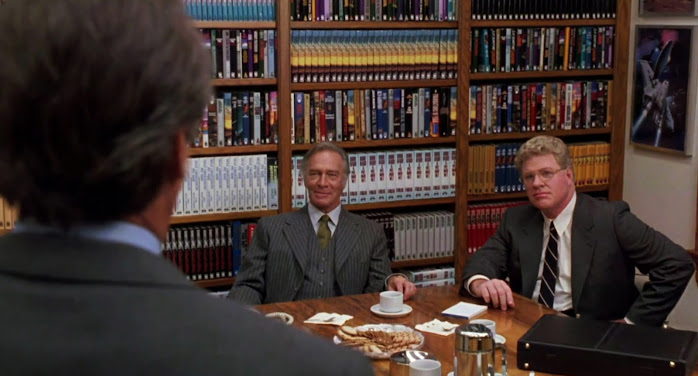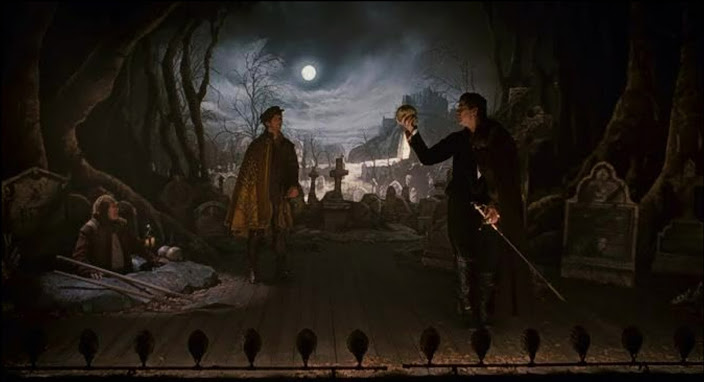Are Howling Successes Spent?
 |
| Werewolf Jack Nicholson Tries Venison for Lunch |
Greenbriar's Last Word on Werewolves
WOLF (1994) --- Wolf refreshes for teaching joys of lycanthropy. Having watched, I would not mind becoming a werewolf myself, minus discomfort of initial bite, small price to pay for power unleashed after. Jack Nicholson really sells the benefits here, Wolf fast becoming for me a favorite performance of his. Imagine if Nicholson had played his Wolf character for AIP thirty years earlier. It might have happened. Let Luana Anders have the Michelle Pfieffer part, Vincent Price or even Rathbone subbing for Christopher Plummer. I can dream, can’t I? But no complaint, Wolf plenty fine as it is. Modern horror for me, and for a long time, has been if anything too horrific. I shy from modern gross-out fx applied to wolf men. What was accomplished by discreet dissolve became onscreen epileptic seizures. Spare me fingers and toes twisting and curling. Nicholson is actor enough not to need pyro-tricks when facial expression w/light hair growth and discreetly grown teeth will do. Too often the monster id takes over the identity not of just characters, but men impersonating them, so where is value for paying to watch your selected star? Make-up upon Nicholson is minimal then, as was more than satisfactory case with Henry Hull, who as I recall told Jack Pierce to go easy applying yak. Jack Nicolson was born to play a werewolf for being wolfish himself. Unlike with Batman, he underplays and is entirely credible as someone damned by fate (bitten in the opening scene). I expect Nicholson respects lycanthropy lore, whereas the Joker was for him … a joke. Besides which Wolf has assets way past mere recital of a monster on the loose and business of containing him. Director Mike Nichols and writers wanted to take their werewolf in an entirely new and adventurous direction.
 |
| Monster of the Boardroom Christopher Plummer Wields His Own Silver Bullet |
Back to rash remark that being a werewolf might be fun, there if nothing else fruit of watching and being lulled by a “smart” monster movie where controlling hands want us to consider positive aspects of transacting one's immortal soul with demons. “Will Randall” (Nicholson) is a retiring, if defeated, book editor with ability but not resolve to rise within corridors of power that is high-powered Manhattan publishing overseen by chilly tycoon Christopher Plummer. Once bitten however, Will/Jack transforms not just into a wolf, but something more attractive to those among us who’d assert themselves more if only courage were there to be assertive, in short Will as everyman he/she would dream to be if only he/she had the nerve to not let others walk on him/her. Fun mid-sections see/hear/taste for Will whose heightened senses yield animal benefits … who knew wild beasts had it so good? Pretty soon Will is king of savage land that is corporate culture, joy in watching him claw ways up, a worm-turn scenario enjoyed in wish fulfillment terms film satisfies best. I’m almost sorry when necessary monster stuff takes lead for a second half and overpowers a final third that less inventive chillers resort to per lycanthrope lore. Still we get welcome twist where Will and so-far human love interest Pfeiffer join their devil’s brood for happy hunting forever after. One could wish such outcome for Larry Talbot and Gwen Conliffe, but 40’s rules being inviolate, we'd not expect dream come true of becoming fully a wolf to enjoy total freedom’s bliss. Could this have been seen as viable alternative to stress of modern life by the nineties? And how about now, especially now? I bet we all know plenty who would swap humanity for stops off that is wolf life, again minus essential bite to get us there.
 |
| Universal Revives Its Classic Plexiglass Logo to Open The Wolfman's Unrated Version |
THE WOLFMAN (2010) --- The Wolfman was among Universal efforts to revitalize “intellectual properties” from the thirties and forties, that is, monsters we’re presumed to have known and loved. The venture cost $150 million to produce, brought back worldwide $130 million, a lot of loss and faint incentive to persist with wolfmen. Greenbriar dealt previous with perceived duds from Universal’s Monster Army that fought and were vanquished by a market not disposed to embrace them. Were werewolves, vampires, and Frankensteins voted quaint and thus chucked by horror fans who outgrew them? The Wolfman was reviewed cruelly and scored but 34% on “Rotten Tomatoes.” Yes, there are those who abide by thumb up or down by this entity, also one called “Metacritic” which gave The Wolfman 43%. I’ve wondered if period setting was the silver bullet. Technical skills and art direction cannot be faulted, The Wolfman astonishing just for how it looks. Benicio Del Toro is outstanding as Lawrence Talbot, reminding me at times of a beardless Paul Muni. Del Toro said in interviews that he was raised on Universal horrors and kept 8mm Castle films to watch on his bedroom wall. The Wolfman, determined to be an “action thriller,” oversells gore as did Hammer horrors during the early seventies when their output coarsened. There is a mystery werewolf who causes worst of trouble, me not pleased by “surprise” unmasking of him. The Wolfman is best when quietest, or maybe I prefer peace amidst the din. As more studio uppers interfere, the louder is volume it seems, shrillest notes perceived the safest by skittish and job-scared execs. CGI has been more and more a culprit since The Wolfman was new, and fresher, in 2010. As we hear increasing call for return to “practical effects,” could it be souped-up fx have had their day, or is that mere wishful thinking?
 |
| Exclusive to the Unrated Version: Benicio Del Toro as Lawrence Talbot Performs Hamlet |
I read on chaotic filming of much that is modern and note directors fired, footage scrapped, costs overrunning. Wolfman director Joe Johnston has done four features since 2010, one of them for TV. Is that a good average for helmsmen nowadays? I’m not sure how directors of overblown monster movies and superhero stuff can leave much personal signature on work, but maybe none of them expect to. The money is at least good, I hope. The Wolfman has worthwhile things about it. Two versions are extant and streaming, the general release at 102 minutes, and an “Unrated” 119 minutes. I watched the latter for figuring it was gorier, so where does that leave my previous and prissy complaint about current horror films being too gory? Fact is, the long cut has highlights regrettably dropped for theatres, like Talbot shown at his London occupation as star Shakespearean actor, a nice and novel touch. Seems every contemporary title I summon at Amazon has alternative iterations, two ways at least to see a feature whether popular in its day or not. Some might say a shorter 102 minutes is still too long to tell a Wolfman story, especially as the 1941 original got it done within a fleet 70 minutes. Latter artists that venerate classics sometimes pay too much homage, pumping tires to near popping point. Look at what has been remade --- King Kong, any or all Draculas, athletic Mummies, the elephantine lot. What if a 70-minute feature were tendered today --- would cinemas and viewership turn such an offering down flat?




4 Comments:
Spider-Man, on pulp and screen, is a spin on werewolf lore with a wish-fulfillment angle. A spider's bite gives a scrawny teenager super-strength and the ability to scamper up walls. He doesn't take on the appearance or appetites of a spider, but the original premise focused on how his powers are often more curse than blessing. Superheroes before and after leaned into qualified wish fulfillment. Heroes were as often as not schlubs transformed by luck: weird science, bizarre accident, being born on another planet, the occasional ancient spell, etc. You can trace a lot of superhero origins to classic monsters, modified to become more explicitly wish-fulfilling (Peter Parker could still get a girlfriend, eventually).
The movie "Batman Returns" has it own version of werewolf lore. A meek woman is pushed out a window and lands in an alley, possibly dead. Stray cats swarm around her body, sniffing and perhaps biting, imparting some unexplained magic felinity. She fashions a sexy costume and becomes Cat Woman, possessed of amazing agility and confidence.
"Son of Dracula" flirts with vampiric eternal life as wish fulfillment punished by crime-doesn't-pay moralizing. The heroine is less seduced than self-sold on immortality; she eventually pitches it to her boyfriend. Chaney's count is more brutish than suave, a smug bully rather than an aristocrat. It plays closer to noir than familiar Universal horror -- Would anybody really want to live forever in that dire southern swampland?
Jekyll and Hyde at MGM likewise flirted with a wish fulfillment fantasy. Once he unleashes Hyde, is the noble doctor really fighting the power of the drug and Man's Baser Nature, or is he simply tempted by the possibilities of a second face and identity? Respectable Jekyll turns down a willing lower-class babe. As Hyde he immediately finds her and sets her up as his mistress. There's a take to explore: Jekyll's drug as pure placebo, exposed as an alibi for debauchery already in mind.
Pulpy stories didn't always require supernatural beings of either the superhero or the unkillable-monster type - regular humans albeit very adept in derring-do sufficed, back in those days of yore.
The movie character of James Bond demonstrates that crossover ( - and back again?), from the "human" type of mortal pulp hero over to the "superhuman" type of unkillable pulp hero, over the course of the series.
I can't believe it's been almost 30 years since "Wolf". I enjoyed it, but don't recall the reviews being very positive. Nobody ever mentions it when talk turns to Nicholson or Nichols, as if it never happened.
Kudos to Kevin K. I've almost never seen WOLF listed in Jack's filmography.
Post a Comment
<< Home